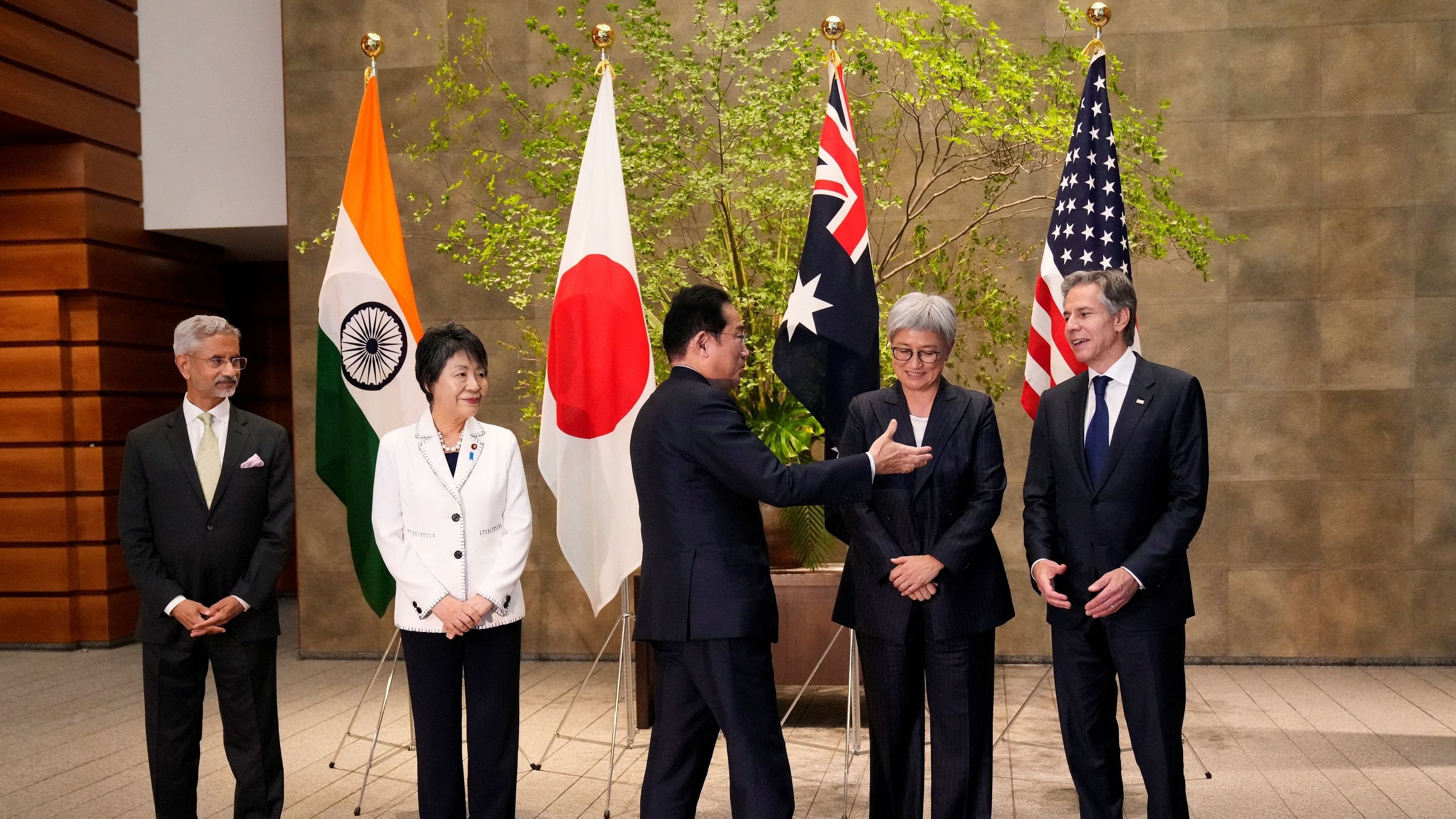
Japanese Prime Minister Fumio Kishida greets US Secretary of State Antony Blinken as he meets with Indian Foreign Minister Subrahmanyam Jaishankar, Japanese Foreign Minister Yoko Kamikawa and US Secretary of State Antony Blinken at the Prime Minister's office after the four ministers participated in their Quad meeting in Tokyo, Japan
Credit: Reuters photo
Tokyo: In a loud and clear message to China, the Quad on Monday reaffirmed its steadfast commitment to a free and open Indo-Pacific, vowing to work towards a region where no country dominates others and each state is free from coercion in all its forms.
At a meeting here, the foreign ministers of the Quad countries called for upholding the free and open rules-based international order and respecting the principle of freedom, human rights, democratic values, sovereignty and territorial integrity of nations.
Without directly naming China, the four foreign ministers expressed serious concern over the situation in the East and South China Seas and reiterated the Quad's strong opposition to any "unilateral actions that seek to change the status quo by force or coercion."
The meeting was attended by External Affairs Minister S Jaishankar, US Secretary of State Antony Blinken, Japanese Foreign Minister Yoko Kamikawa and Australia's Penny Wong.
"All countries have a role in contributing to regional peace, stability, and prosperity while seeking a region in which no country dominates and no country is dominated, competition is managed responsibly, and each country is free from coercion in all its forms and can exercise its agency to determine its own future," the ministers said in the statement.
The Quad also vowed to work towards a free, open and prosperous Indo-Pacific, a region that has seen increasing Chinese military muscle-flexing in the last few years.
"We reaffirm the Quad's steadfast commitment to a free and open Indo-Pacific, which is inclusive and resilient, and are united in our commitment to upholding the free and open rules-based international order, with its strong support for the principle of freedom, human rights, the rule of law, democratic values, sovereignty and territorial integrity, and peaceful settlement of disputes," the ministers said.
The ministers also referred to increasing Chinese manoeuvres in the South China Sea, especially the "dangerous use" of coast guard and maritime militia vessels.
"We continue to express our serious concern about the militarisation of disputed features, and coercive and intimidating manoeuvres in the South China Sea, " the joint statement said.
"We also express our serious concern about the dangerous use of coast guard and maritime militia vessels, the increasing use of various kinds of dangerous manoeuvres, and efforts to disrupt other countries’ offshore resource exploitation activities," it said.
The ministers emphasised the importance of adherence to international law, particularly as reflected in the UN Convention on the Law of the Sea (UNCLOS), to address challenges to the global maritime rules-based order, including in the South and East China Seas.
The ministers also "unequivocally" condemned terrorism and violent extremism in all its forms including cross-border terrorism.
"We deplore the use of unmanned aerial vehicles (UAVs), drones, tunnels and information and communication technologies by terrorists and terrorist entities," they said.
"We strongly reiterate our condemnation of terrorist attacks, including the 26/11 Mumbai and Pathankot attacks and call for bringing the perpetrators of these attacks to justice without delay," they added.
The Quad urged all countries to take immediate, sustained and irreversible action to prevent territory under their control from being used for terrorist purposes.
"We are committed to working together to promote accountability for the perpetrators of terrorist attacks and support implementation including through domestic designations of UN Security Council resolutions as they pertain to sanctions," the ministers said.
"We reiterate the call for concerted action against all UN-listed terrorist groups including Al-Qa’ida, ISIS/Daesh, Lashkar e-Tayyiba (LeT), Jaish-e-Mohammad (JeM), and their proxy groups," they said.
The ministers said the Quad is committed to international cooperation and working together with our international and regional partners in a comprehensive and sustained manner to strengthen their capacity to prevent, detect and respond to threats posed by terrorism and violent extremism.